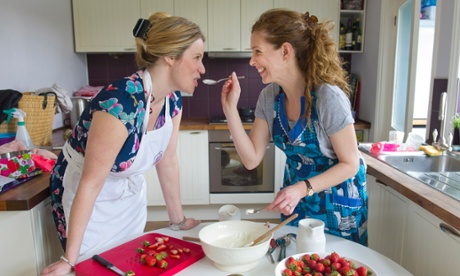
How would you describe your business
We make the UK’s first Greek-style, frozen yoghurt lollies. Full of fruit, creamy yoghurt and enriched with vitamin D, they are naturally low in sugar and less than 56 calories a pop.
What is the story behind the brand?
Unable to find any lollies that we were happy to feed our young children, Claudia and Fin, co-founder Meriel Kehoe and I set about making our own. We borrowed an ice-cream machine and whipped up recipes for all sorts of exciting flavours. The lollies went down so well with our children (who are our chief taste testers) that we started sharing them with friends at playgroups.
What do you think has been your proudest achievement to date?
Winning a 12-month contract to supply 250 Sainsbury’s stores nationwide, when we hadn’t sold a single lolly anywhere else.
And your most challenging moment?
Our proudest – and scariest – moment was when we realised the enormity of having to upscale the business to supply Sainsbury’s. Their first order of 16,000 lollies came after we entered and won PitchUp with Sainsbury’s – a competition that invites new startups to pitch their food ideas. Nobody was more shocked than us when we won. Without such an amazing break, we wouldn’t be where we are today.
What made you stand out from the other entries?
We had a first-to-market product that looked and tasted very different to anything else in the category. As first-time mums who had looked for a healthier lolly for our own kids, we knew there was a gap in the market for people who wanted to feel good about providing healthy treats for their children. Because the product is 100% natural and our lollies contain fewer than 57 calories, Sainsbury’s were confident we would also appeal to dieters and health-conscious adults too.
How have you funded your business, and do you have any tips for other entrepreneurs looking for investment?
We used our savings, took out a Start Up Loan each and have had further investment from two private investors. Our tip would be to have a very clear idea of where you want your business to be in three years and five years’ time and then work out how achievable that is with the money you have. You quickly get a sense of when you need a cash injection and how much it might need to be.
What’s next for the business?
We’re always looking for new inspiration and trying to keep abreast of food trends and consumer needs. We’ve been working on some new flavours and format ideas, plus we’re working on bigger plans for a couple of years’ time.
What advice would you offer to budding food entrepreneurs?
You can’t do enough homework on your competitors and what consumers need, and this learning never ends. Week in, week out, every brand is trying to do something new or better so it’s vital you keep watching.
As a startup, you need a strong brand and USP to survive. Without a heap of cash to throw at marketing it’s vital you have something to talk about and very strong reasons for consumers to buy your product over the more established bigger brands.
Do you have a mentor? If not, where do you look for business advice?
No, but our investors have backgrounds in finance and advertising, which has proved invaluable. We also talk to everyone who will listen and ask lots of questions – it’s brilliant how many other startups and small businesses we have learned from.
It’s good to be around other startups, so network or just call them. Sharing information saves time and money, and offloading stops you from feeling isolated.
What’s the best thing about running your own business?
Seeing customers walk down the supermarket aisles and putting your product in their trolley – it doesn’t get any better than that.
Lucy Woodhouse is a co-founder of Claudi & Fin
Sign up to become a member of the Guardian Small Business Network here for more advice, insight and best practice direct to your inbox.

